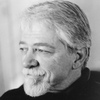B H Fairchild
B H Fairchild Poems
How do the winter moths survive when other moths die? What enables them to avoid freezing as they rest, and what makes it possible for them to fly -- and so to seek food and mates -- in the cold?
Bernd Heinrich, Scientific American
1. The Himalayas
...
Leonardo imagined the first one.
The next was a pole lathe with a drive cord,
illustrated in Plumier's L'art de tourner en perfection.
Then Ramsden, Vauconson, the great Maudslay,
...
I am tired of the heave and swell,
the deep lunge in the belly, the gut's
dumb show of dance and counterdance,
sway and pause, the pure jig of nausea
...
"Gesang ist Dasein"
A small thing done well, the steel bit paring
the cut end of the collar, lifting delicate
...
In his fifth year the son, deep in the backseat
of his father's Ford and the mysterium
of time, holds time in memory with words,
night, this night, on the way to a stalled rig south
...
Outside my window the wasps
are making their slow circle,
dizzy flights of forage and return,
hovering among azaleas
...
How in Heraclitus
ideas of things, quality, and event
coalesce—sun/warmth/dawn—
the perceiver/perceived, too,
...
The heavy bodies lunge, the broken language
of fake and drive, glamorous jump shot
slowed to a stutter. Their gestures, in love
...
B H Fairchild Biography
B.H. Fairchild is an award-winning American poet and former college professor. His most recent book is Usher, and his poems have appeared in literary journals and magazines including The New Yorker, The Paris Review, and The Southern Review. Life He was born in Houston, Texas, and grew up in small towns in the oil fields of Oklahoma, Texas, and Kansas, later working through high school and college for his father, a lathe machinist. He taught English and Creative Writing at California State University, San Bernardino and Claremont Graduate University. He lives in Claremont, California with his wife, Patti, and dog, Minnie. His third poetry collection, The Art of the Lathe, winner of the 1997 Beatrice Hawley Award, brought Fairchild's work to national prominence, garnering him a large number of awards and fellowships. The book ultimately gave him international attention, as The Way Weiser Press in England published the U.K. edition of the book.)
The Best Poem Of B H Fairchild
Thermoregulation In Winter Moths
How do the winter moths survive when other moths die? What enables them to avoid freezing as they rest, and what makes it possible for them to fly -- and so to seek food and mates -- in the cold?
Bernd Heinrich, Scientific American
1. The Himalayas
The room lies there, immaculate, bone light
on white walls, shell-pink carpet, and pale, too,
are the wrists and hands of professors gathered
in the outer hall where behind darkness
and a mirror they can observe unseen.
They were told: high in the Himalayas
Buddhist monks thrive in sub-zero cold
far too harsh for human life. Suspended
in the deep grace of meditation, they raise
their body heat and do not freeze to death.
So five Tibetan monks have been flown
to Cambridge and the basement of Reed Hall.
They sit now with crossed legs and slight smiles,
and white sheets lap over their shoulders
like enfolded wings. The sheets are wet,
and drops of water trickle down the monks'
bare backs. The professors wait patiently
but with the widened eyes of fathers
watching new babies in hospital cribs.
Their aluminum clipboards rest gently
in their laps, their pens are poised,
and in a well-lit room in Cambridge
five Tibetan monks sit under heavy wet sheets
and steam begins to rise from their shoulders.
2. Burn Ward
My friend speaks haltingly, the syllables freezing
against the night air because the nurse's story
still possesses him, the ease with which she tended
patients so lost in pain, so mangled, scarred, and
abandoned in some arctic zone of uncharted suffering
that strangers stumbling onto the ward might
cry out, rushing back to a world where the very air
did not grieve flesh. Empathy was impossible,
he said. A kind of fog or frozen lake lay between her
and the patient, far away. Empathy was an insult,
to look into the eyes of the consumed and pretend,
I know. It must have been this lake, this vast
glacial plain that she would never cross, where
the patient waved in the blue-gray distance,
alone and trembling the way winter moths tremble
to warm themselves, while she stood, also alone
and freezing, on the other side, it must have been
this unbearable cold that made her drive straight home
one day, sit down cross-legged in the center of
and empty garage, pour the gasoline on like a balm,
and calmly strike a match like someone starting
a winter fire, or lost and searching in the frozen dark.
